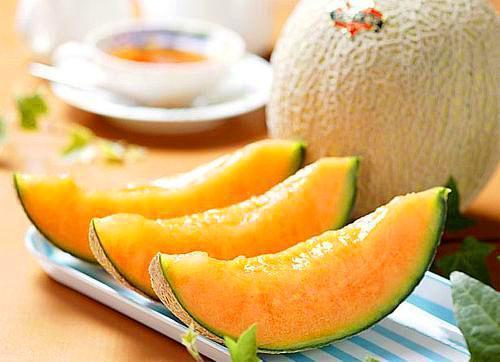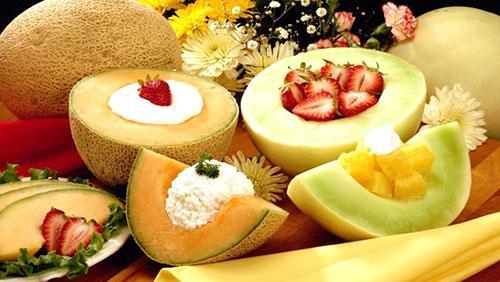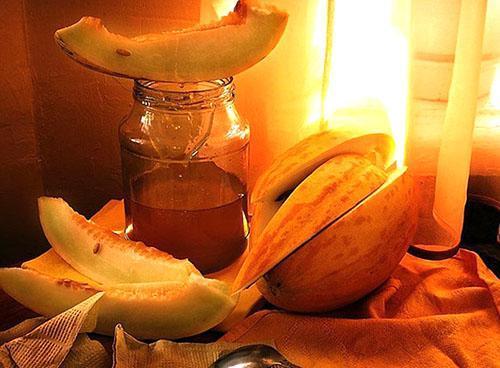Why and with what can you not eat a melon?
 We don't think about product compatibility when we get to the festive table. Later we complain about the malaise, referring to poor-quality cooking. In fact, we ate a lot of different treats and paid for it. A particular effect with such promiscuity is the use of melon as a dessert. What you can't eat melon and why, let's figure it out.
We don't think about product compatibility when we get to the festive table. Later we complain about the malaise, referring to poor-quality cooking. In fact, we ate a lot of different treats and paid for it. A particular effect with such promiscuity is the use of melon as a dessert. What you can't eat melon and why, let's figure it out.
What is known about product compatibility

If, however, foods that require different components in the gastric juice are served at the same time, then they mutually neutralize each other and digestion is slow, severity and other problems arise. Therefore, they talk about the compatibility of products for simultaneous administration.
 Types of products that are included in a person's menu:
Types of products that are included in a person's menu:
- protein, requiring acidic enzymes for digestion;
- acidic plant foods;
- slightly acidic, non-starchy plant products;
- starchy foods fermented in an alkaline environment.
Traditional main course, meat with porridge or potatoes poorly digested, but good with cabbage garnish. With the wrong food intake, it is poorly absorbed, most of the nutrients go to waste.
The excellent vitamin greens of lettuce and spinach, when added with salt, completely lose their benefits. Green tea with milk is a useless combination. Coffee and sandwich mutually destroy usefulness.
Melon is incompatible with any food. It is eaten in the intervals between meals of other food, constituting at least two hours. Fresh milk belongs to the same incompatible products. It is a protein product, but in an acidic environment it curls up.
Why can't melon be eaten with other foods?
 Melon belongs to the pumpkin family and is a close relative cucumber... From the very appearance on the tables of the nobility, it has become a favorite dessert. No one knew then that improper eating of a melon can cause death. After the death of another lover of food, it happened that the servants of the poisoners were executed. Later we figured out that melon cannot be a dessert. Its taste and aroma are enjoyed at the moment when the stomach is unloaded and ready to accept a new portion of food.
Melon belongs to the pumpkin family and is a close relative cucumber... From the very appearance on the tables of the nobility, it has become a favorite dessert. No one knew then that improper eating of a melon can cause death. After the death of another lover of food, it happened that the servants of the poisoners were executed. Later we figured out that melon cannot be a dessert. Its taste and aroma are enjoyed at the moment when the stomach is unloaded and ready to accept a new portion of food.
It turns out that the sweet vegetable will stay in the stomach for a few minutes, the melon mass will be digested in the intestines. If you prevent it, keep it in the stomach, you won't end up with problems. Here it will ferment quickly, without being digested, with all the consequences - flatulence, diarrhea, colic, nausea. Therefore, to fully enjoy the honey taste of the Charju melon, you need to empty your stomach and slowly put a piece in your mouth with a fork, closing your eyes from pleasure. There are many benefits to this eating. This is why melon should be eaten separately from other foods.
 The low-calorie product contains 35 Kcal per 100 g, but contains:
The low-calorie product contains 35 Kcal per 100 g, but contains:
- energy components are mainly carbohydrates;
- alimentary fiber;
- vitamins and minerals.
However, melon contains 10 times more iron than chicken and milk. Potassium is present 120 mg, a lot of niacin, vitamin C.Due to the high concentration of folic acid, the product is recommended for people with weakened brain activity, the elderly. Melon is also useful for liver diseases, anemia, diseases of the cardiovascular system. The substance seperoxide dismutase, which is present in the melon, restores peace of mind and relieves fatigue.
 At the same time, a sweet product is not recommended for weight loss patients with diabetes. For medicinal purposes, melon is introduced into the diet under the supervision of a doctor.In support of the fact that melon is an independent product that is incompatible with others, we will bring the body's reaction to the simultaneous intake of different components:
At the same time, a sweet product is not recommended for weight loss patients with diabetes. For medicinal purposes, melon is introduced into the diet under the supervision of a doctor.In support of the fact that melon is an independent product that is incompatible with others, we will bring the body's reaction to the simultaneous intake of different components:
- Melon with milk or fermented milk products will create a violent laxative effect. Therefore, you should not buy yogurt with melon for children. Despite the assurances of manufacturers, if the products are natural, diarrhea will not keep you waiting.
- You cannot eat a melon completely on an empty stomach, problems with bloating and nausea will begin. It is dangerous for those who have problems with the gastrointestinal tract.
- Alcohol and melon are incompatible. There are three paths of problems here. Some complain of severe constipation, others pass the TRP norms along the way to the toilet... There are still others who are taken away by an ambulance for gastric lavage.
- Breastfeeding moms shouldn't feast on melon. The baby will inevitably experience loosening of the chair. All mothers are afraid of this, since dehydration of the child's body instantly sets in.
- It is also not recommended to drink a melon with water, fermentation, colic and diarrhea may occur soon.
The combination leads to trouble and explains why melon should not be eaten with other foods. In a special place is the interaction of two medicinal products, honey and melon in the stomach.
Why can't you eat a melon with honey?
 Since the old days, the order has been passed not to eat melon with honey. In those days, intestinal obstruction was called volvulus. So, it was believed that honey with melon creates a stone in the intestines, permeability is impaired, and terrible torment awaits a person.
Since the old days, the order has been passed not to eat melon with honey. In those days, intestinal obstruction was called volvulus. So, it was believed that honey with melon creates a stone in the intestines, permeability is impaired, and terrible torment awaits a person.
However, there are people who eat honey and melon at the same time without consequences. Doctors believe that the compatibility of melon and honey, even for a healthy person, is questionable. For those who have undergone abdominal surgery and have adhesions and scars, bowel obstruction may occur. Therefore, it is not worth risking your health and turning two medicinal products into an explosive mixture for the body. There are only a few people who always eat melon with honey and do not experience unpleasant sensations. Before experimenting, think about who needs it?
Delusional, superstitious nonsense! Melon + ONLY raw water = diarrhea! Melon + not fermented milk products, but milk = diarrhea!
Everything else is just from the fact that very often in Wed. Asian melons are re-fertilized with saltpeter in lethal doses to accelerate growth! Don't buy melons until mid-August. Well, green too!
Not only melon, but also any fresh fruit is not recommended to be washed down with water (it does not matter - raw or boiled). This promotes the fermentation process and all the accompanying phenomena.